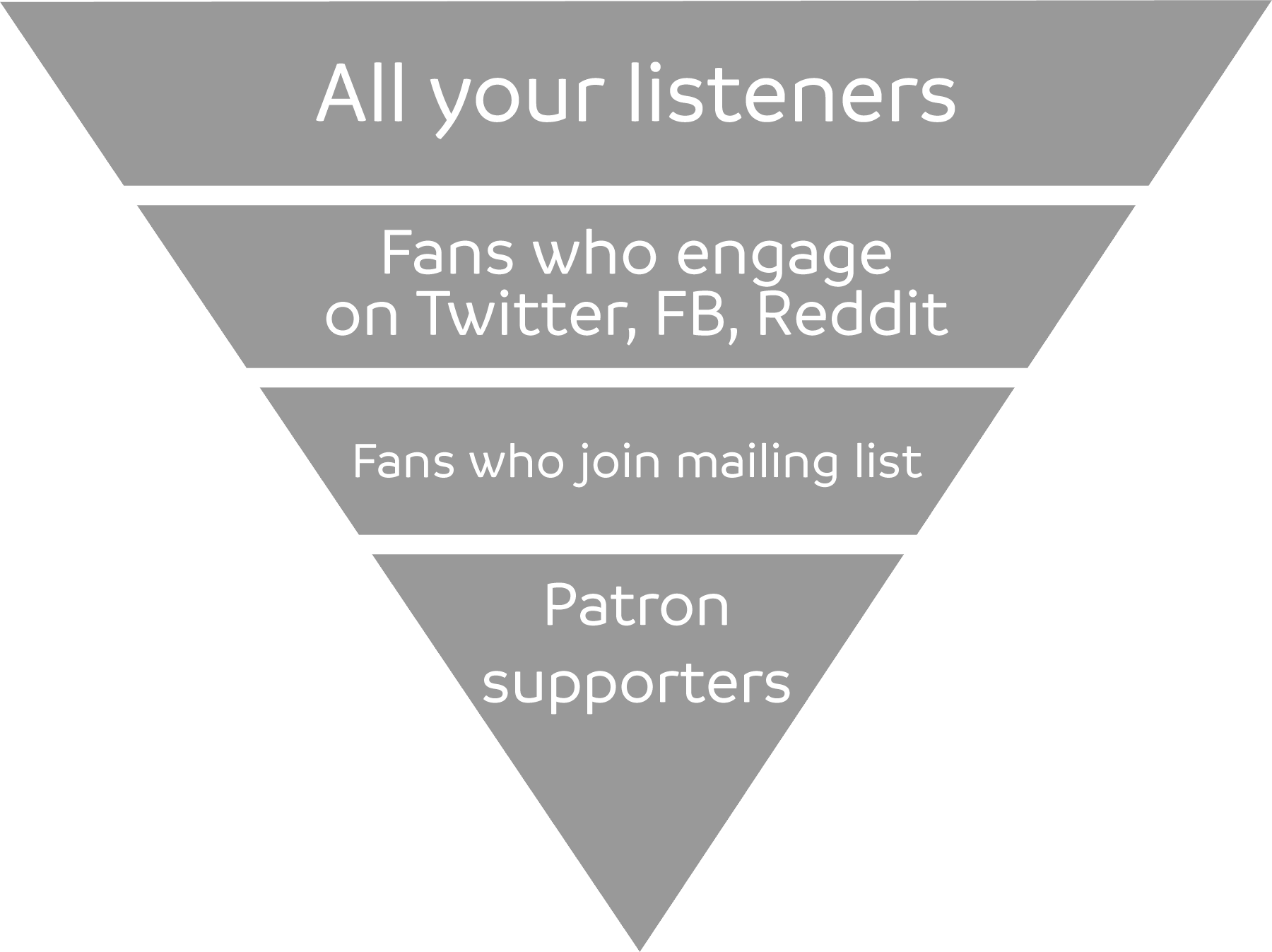How to make money from your tiny podcast
The general consensus right now is that if your show doesn't have 30,000 - 50,000 downloads per month, you can't get any sponsor to look at you seriously. To really get the big advertisers (MailChimp, Squarespace) you need 50,000 downloads per episode.
If you're looking to earn an income from a podcast with smaller download numbers, here's what's worked for me.
Background -- my podcasts (MegaMaker, Product People) focus on a very specific niche. They're for software developers, designers, and other makers who want to launch their own software products.
How many of my listeners might support my show?
What percentage of my listeners might support the show? Is it 3%, 5%, 10%?
One way to determine this is to figure out the amount of "purchasing intent" your listeners have.
For example, the book I just released had an email list where people get notified about the launch. Here's what the math looks like:
1,359 people on the launch list663 of those people bought= 49% conversion rate
Now, let's compare that conversion rate to my overall list:
12,703 people on my mailing list674 of those people bought= 5% conversion rate
So 5% of my big list bought. But when I narrow it down to the launch list, the % is much higher (49%).
The podcaster's sales funnel looks like this:
"Asking listeners for money feels yucky."
I'm worried about damaging the goodwill I've built up with my audience. If I ask them for their support, won't I lose their trust?
Here's a quick example: I recently got into Iron Maiden. I wasn't allowed to listen to them in the '80s, but now as a 30-something year old man, I was curious. At first, I just listened on Spotify for free. Then I started buying their albums on iTunes. Then I ordered t-shirts.
I'd spent probably $100 on Maiden stuff when I got an email from Iron Maiden asking me to pay $117.86 for concert tickets.
Iron Maiden isn't worried about damaging their goodwill when they email me. They know they've earned my trust. Even though $117.86 is a ridiculous amount to pay, I did it gladly.
Sometimes as creatives, we're too worried about the trolls. For sure there were a few metal heads that said: "Maiden sucks! I'd never pay that kind of money for a show." But for every one of them, there were thousands of people that were like: "YES! I'll pay anything!"
In what ways can a small podcast earn revenue?
Here are ideas I've tried:
- Digital products: for me, this has been the winner. I write books that my audience is interested in and sell those directly to them. My two most recent are Marketing for Developers and Jolt. Since I've gone independent in November, about 60%-70% of my income has come from books our courses I've created. Conclusion: if your podcast lends towards teaching this is a great option.
- Membership: it's tricky to run an online community, but so far the benefits have outweighed the challenges. Here's the membership site for Product People. The most challenging part is finding the right platform. Currently, I've settled on Discourse (hosted on Digital Ocean) plus Slack. Conclusion: nice way to build recurring revenue into your podcast. I highly recommend selling annual subscriptions instead of monthly.
- Crowdfunding: I ran my own campaign using a WordPress plugin called Ignition Deck. The idea was that listeners could support future topics by sponsoring their favorite idea. Conclusion:I wouldn't do this one again personally. I achieved all my goals, but most of the support came from a single advertiser who would have supported regardless. It was also really difficult to run the campaign + produce the shows.
- Micro-sponsorships: this was a precursor to the crowdfunding. The idea here was to allow people to sponsor for as little as $99. This worked well, but you really have to push it to get people to sponsor. My best week was when I was doing a specific story arc (the infamous burrito episode) - over $1,089 in sponsorships. Conclusion: you really have to be aggressive to get any ad money. But, there are listeners who want to promote their projects, and would be willing to spend $99 to $199. I might try this approach again.
- Physical products: using Printful + WooCommerce, I run an online MegaMaker store. Generally, I'm making about $5 profit per item (that's about the same as you'd get from Cotton Bureau). Conclusion: It's not a good way to make money. However, it's been awesome for fans.
There are other models I've seen work as well:
- Patreon: Drew, at the Sleep with Me podcast, has over 1,739 people supporting him on Patreon. He's currently earning about $6,000 per month. Getting people to donate monthly can be challenging, but for the right podcast, it makes sense. Conclusion: if your podcast provides consistent, recurring, value, this is a great option.
- One campaign a year: NPR and other public broadcasters will often do one big fundraising campaign per year. I've also seen smaller shows (like Merlin Mann and John Roderick) do a "once a year t-shirt sale." Conclusion: limiting fundraising to one particular segment of time really helps focus on the need. With a "once a year t-shirt sale" you're also adding urgency to the mix.
Have you seen anything else that's worked? Let me know on Twitter.
Cheers,
Justin Jackson
